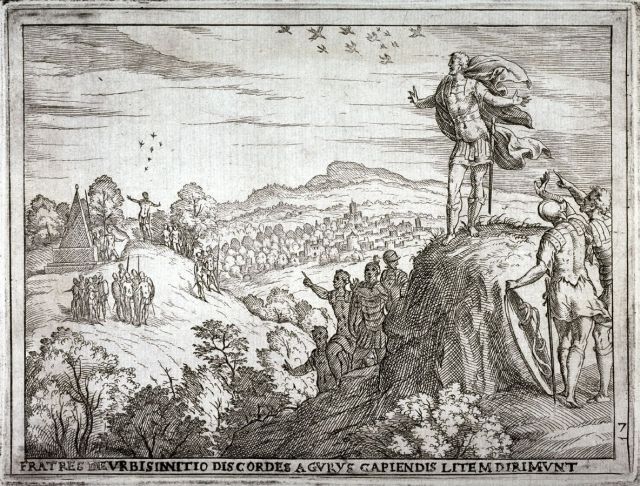
The Brothers, Disputing Over the Founding of Rome, Consult the Augurs
Digression on divination.
And being that, with a princeps educated and studious in all areas of knowledge, malevolent men impute as twisted the arts of foreknowing the future, let us briefly turn our attention upon how this may also add to a wise man, this kind of learning, scarcely trivial.
The spirit of all elements, inasmuch as they are of perennial form, thrives always and everywhere in the stirring of portending, by those things which we aspire to by various teachings, it imparts upon us the gifts of divining : and the essential powers, placated by diverse ceremony, just as if from eternal veins of springs, supply in abundance prophetic words to mortality, over which the divine will of Themis is said to preside, whom theologians of old set alongside Jove, the life-force of quickening, in his bed and throne, she so named by that which Greek discourse calls τεθειμένα (“set in place”), because she fashions to foreknow the decrees fixed by destined law in the future.
Auguries and auspices are not gathered by the will of fowl, unknowing of the future—not even some fool would say that—but god directs the flight of birds, so that singing beaks or wings flying past, by turbulent motion or gentle, might foreshow the future. For the kindness of the divine will, whether because men are merited or because he is touched by their affection, loves also to reveal by these arts what looms.
Likewise, those applied to prophesying innards of cattle, accustomed to be resolved in innumerable forms, they know what happens. The inventor of this teaching, a certain man—Tages by name, so it is told, in regions of Etruria, seemed to emerge suddenly form the earth
Things to come are further revealed on occasion when the hearts of men roil, but divine things are spoken. For the Sun (so the natural philosophers say), mind of the world, scattering our minds from himself like sparks, when he violently ignited them, restored them privy to the future. From this the Sibylls frequently say they blaze with the great burning power of flame. Aside from these, noises of voices signify many things, and happenstance signs, yea even thunder and lightning, and likewise the flashes from the furrough of stars.
Even the reckonings of dreams would be reliable and undoubted, except the reckoners are sometimes deceived in their conjectures. These (as Aristotle confirms) are fixed at the time, and stable, when with the living sleeping deeply, the pupils of the eyes, turned neither this way nor that, discern most rightly.
An since the common folly often grumbles such things in their ignorant muttering, “If there were some knowledge of foreseeing, why is this man ignorant that he will fall in war, or that one that he will suffer this or that?” let suffice to be said that even the grammarian has sometimes spoken barbarously, and the musician has played off-key, and the doctor was ignorant of remedies; but grammar and music and medicine do not therefore subside. From this, brilliantly, Tullius (among others) also said, “Signs are shown by the gods of future affairs. In these, if anyone should go astray, it is not the nature of the gods but the conjecture of mankind that sins.”
N.B. Tullius is better known today as Cicero. His full name was Marcus Tullius Cicero.

